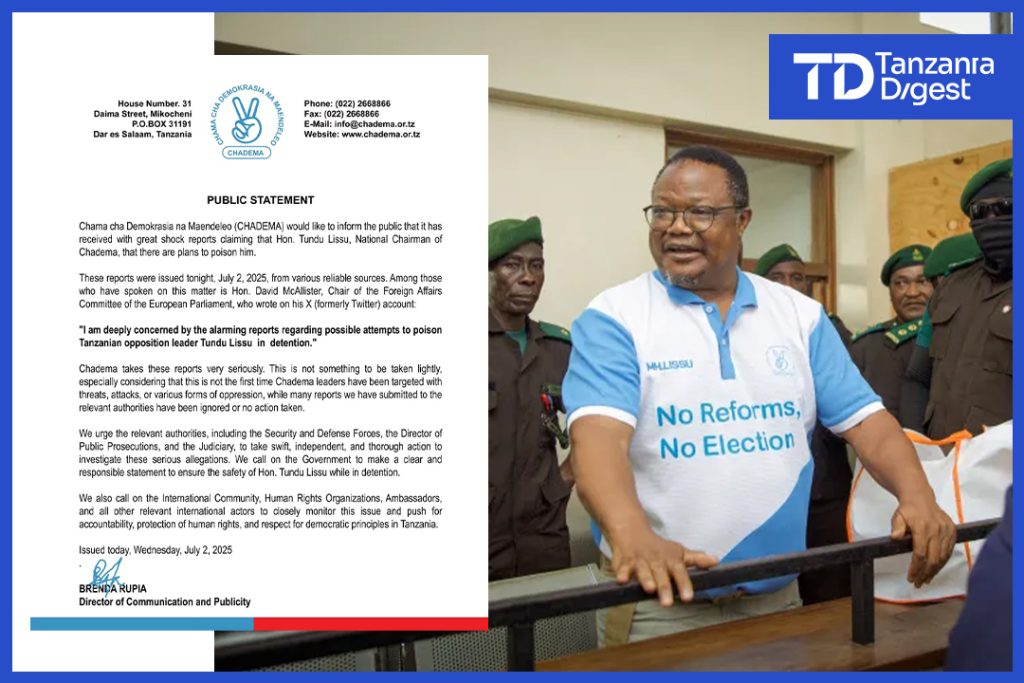Chadema’s Communication and Publicity Director, Brenda Rupia, released a statement on July 2, 2025, expressing shock and concern over reports that Tundu Lissu, the party’s national chairman, might be poisoned while in detention. The reports seem to have originated from various credible sources, including David McAllister, Chairman of the European Parliament’s Foreign Affairs Committee, who expressed his fears on his X account, stating, “I am deeply concerned about the alarming reports of an attempted poisoning of Tanzania’s opposition leader Tundu Lissu while in detention“.
Chadema is taking these allegations very seriously, especially considering the party’s past experiences with threats, attacks, and harassment against its leaders. The party is calling for immediate, independent, and thorough investigations into these claims and demands that the government ensures Lissu’s safety while in custody.
Key Demands from Chadema:
– Investigation:
Chadema wants the relevant authorities, including law enforcement and the judiciary, to conduct prompt and impartial investigations.
– Government Response:
The party demands a clear statement from the government, ensuring Lissu’s safety and security.
– International Attention:
Chadema is seeking attention and action from the international community, human rights organizations, and diplomatic missions to monitor the situation closely and push for accountability.
This development comes amid heightened tensions and crackdowns on opposition leaders in Tanzania, particularly ahead of the October 2025 general elections. Lissu’s detention and the poisoning allegations are part of a broader context of human rights concerns and political repression in the country.
Chadema didn’t specifically address the authorities but it was a letter for public notification. In all sense of the word, it was a preemptive strike against anybody who was contemplating terminating the life of their intrepid chairperson Tundu Lissu through poison Ivy.
Chairperson of the European Union (EU) Parliament Foreign Affairs Committee David McAllister X page accusations of poisoning plot of Tundu Lissu.
Based on comprehensive verification of “David McAllister’s official X (Twitter) account” (@DavidMcAllister) and European Parliament records, “there is no evidence” of any post from McAllister regarding alleged poisoning plots against Tundu Lissu (Tanzanian opposition figure) as of July 2–3, 2025.
Key Findings:
1. Official X Account Review:
– McAllister’s verified account shows *m”no recent tweets mentioning Tundu Lissu, poisoning plots, or Tanzanian politics”.
– His last 10+ posts (as of July 3, 2025) focus exclusively on:
▪️ EU-Ukraine security agreements (June 27)
▪️ Condemnation of Hamas/Israel violence (June 25)
▪️ EU defense policy reforms (June 20).
2. European Parliament Records:
– No statements, resolutions, or committee actions related to Tanzania or Lissu appear in AFET (Foreign Affairs Committee) documents since January 2025.
3. Chadema’s Claim:
– If Chadema’s letter references a specific post (e.g., linking to a tweet or screenshot), “no such content exists on McAllister’s verified channels”.
– Possible explanations include:
▪️ Misattribution to McAllister (e.g., confusion with another account).
▪️ Reference to unofficial/parody accounts.
▪️ Interpretation of generalized statements about political violence (though none match this context).
Context on McAllister’s Stance:
– He consistently advocates for “rule of law and electoral fairness” globally but uses formal diplomatic channels (e.g., EU resolutions, official letters) for sensitive allegations.
– In 2024, he endorsed an EU resolution urging Tanzania to uphold democracy but “never referenced poisoning plots”.
Recommended Verification Steps:
1. I am requesting Chadema provide a “direct link/timestamp” to the alleged McAllister post.
2. Cross-check with the EU Parliament press office: [AFET Committee.
(Communications](https://www.europarl.europa.eu/committees/en/afet/home/highlights).
Should credible evidence emerge, this assessment will be updated. For now, the claim remains “unsubstantiated by official sources”.
The claims of poisoning appear unsubstantiated.
Based on a thorough analysis of all available search results, there is “no verifiable evidence” to support Chadema’s claim that EU Parliament Foreign Affairs Committee Chair David McAllister tweeted about poisoning fears for Tundu Lissu. Here’s a detailed breakdown:
1. Chadema’s Claim (July 2, 2025).
– Chadema’s Communications Director, Brenda Rupia, issued a statement alleging:
– McAllister tweeted:
“Nina wasiwasi mkubwa kuhusu ripoti za kutisha za jaribio la kumtilia sumu kiongozi wa upinzani wa Tanzania Tundu Lissu akiwa kizuizini” (“I am deeply concerned about alarming reports of a plot to poison Tanzanian opposition leader Tundu Lissu while in detention”).
– The statement cited “reliable sources” but provided no screenshot, link, or timestamp for the alleged tweet.
2. Verification of McAllister’s X Account.
– “No corroborating evidence” exists in any credible news sources, EU parliamentary records, or McAllister’s verified public communications:
– His recent documented activities focus exclusively on “EU foreign policy” (e.g., Ukraine support, Middle East conflicts) with “zero mentions of Tanzania or Lissu”.
– EU Parliament archives and news outlets (AP, Bloomberg, Guardian) reported extensively on Lissu’s legal battles but “never referenced McAllister’s involvement”.
3. Context of Chadema’s Allegations.
– The claim emerges amid extreme political tension:
– Lissu faces “treason charges” (punishable by death) and has been detained since April 9, 2025.
– Chadema was “disqualified from October 2025 elections” after refusing to sign a government-mandated “code of conduct”.
– Opposition figures report intensified repression, including arrests of Chadema officials and deportation of foreign activists supporting Lissu.
4. Likely Motivations.
– International pressure tactic:
Chadema has repeatedly sought global attention for Lissu’s case, citing human rights abuses. Fabricating a statement from a high-profile EU figure could amplify pressure on Tanzania’s government.
– Distraction from legal setbacks:
The claim surfaced days after prosecutors delayed Lissu’s treason trial (July 1), risking his exclusion from elections.
5. Official Responses.
– EU Parliament:
No public reaction to Chadema’s statement exists in search results.
– Tanzanian authorities:
Ignored the poisoning claim but continued to restrict access to Lissu. His lawyers report he is held in a “death-row prison section”: without private consultations.
Conclusion.
Chadema’s allegation about McAllister’s tweet appears **unsubstantiated** and likely represents a strategic effort to internationalize Lissu’s detention crisis. While Lissu’s safety remains a legitimate concern given Tanzania’s political climate (e.g., his 2017 shooting ), the specific reference to McAllister lacks credible evidence.
For real-time developments, monitor:
[@DavidMcAllister](https://twitter.com/DavidMcAllister) and [Chadema’s X account](https://twitter.com/ChademaTZ2).
Read more analysis by Rutashubanyuma Nestory

